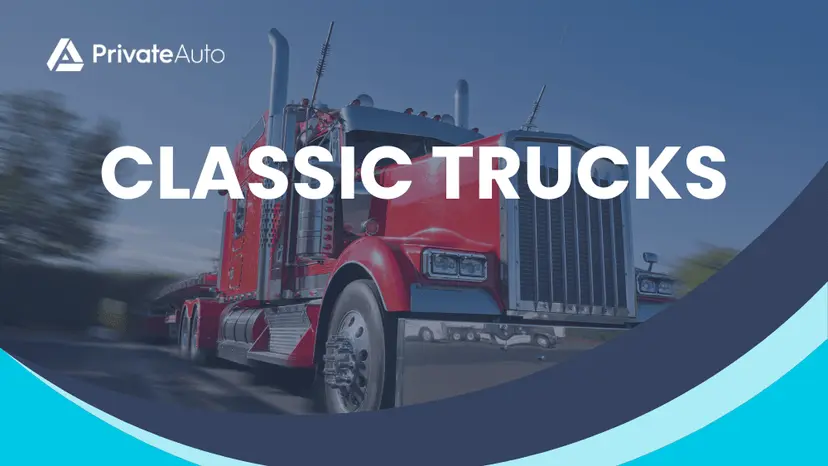
Types of Classic Trucks
Here are the main subcategories of classic trucks:
1. Antique trucks: these are early models that laid the groundwork for classic trucks and were typically manufactured before 1918. Notable examples include the 1912 Ford Model T Pickup and the 1917 Dodge Brothers Commercial Car.
2. Vintage trucks: produced between 1919 and 1930, representing a transitional period in truck manufacturing history. Popular models from this era include the 1925 Chevrolet Superior Series K and the 1929 International Harvester Model L.
3. Classic trucks: older than 25 years and encompass iconic models known for their durability and design. Examples of classic trucks include the 1956 Ford F-100, the 1967 Chevrolet C10, and the 1972 Dodge D-Series.
4. Modern classic trucks: these are more recent models that have gained classic status due to their impact on truck history. Modern classic trucks include the 1993 Toyota Hilux, the 1998 Dodge Ram 1500, and the Ford F-series pickup truck.
While there is some overlap or disagreement about the above categories, they generally hold true.
Advantages of Classic Trucks
1. Value
2. Uniqueness
3. Nostalgia
4. Simple mechanics
5. Low insurance costs

Value Appreciation
Uniqueness
Nostalgia
Simple mechanics
- Engines often utilize basic carburetion rather than computerized fuel injection controls. This makes tuning and modifications more straightforward.
- Classic cars have simpler electrical systems than current vehicles with their intricate network of sensors and modules. Troubleshooting issues is more straightforward.
- No onboard engine management computers to diagnose. Mechanical issues can be identified through hands-on inspection and testing.
- Transmissions have fewer forward gears (3-4 speeds) and simpler electronic controls. Shifting feels more hands-on and intuitive.
- Ignition points, condensers, and distributors are basic compared to modern computerized ignition control modules. They’re easy to adjust and service.
Lower Insurance Costs
There are a few key reasons for this:
- Classic trucks are typically not used for daily commutes, so fewer miles driven annually lowers risk. This is why most insurance companies offer discounted ” pleasure use” plans.
- Owners tend to be older and more experienced drivers with good records, representing lower risk. Safe storage also reduces theft and damage risk.
- Limited usage means lower premiums for collision and comprehensive insurance. Most owners opt for basic liability coverage.
- No need for expensive collision avoidance tech and replacement parts coverage.
Disadvantages of Owning a Classic Truck
1. Fuel inefficiency: classic trucks tend to be gas guzzlers.
2. Unreliability: classic trucks can be less reliable than modern vehicles due to their age and older technology. Regular maintenance and tune-ups are essential to keep them running well.
3. Lack of comfort and convenience: classic cars lack modern comforts and conveniences, such as air conditioning, power windows, and infotainment systems.
4. Insurance limitations: some insurance policies for classic cars may not cover the actual value of the car or allow daily driving.
5. Parking: many classic vehicles are larger and take up more space, making parking and garage storage more challenging compared to modern compact cars.
6. Expensive parts: parts for classic cars can be expensive, as they may need to be custom-fabricated or imported from other countries.
7. Rust and corrosion: classic trucks, especially those made before the 1980s, are more prone to rust and corrosion.
8. Lack of safety features: classic cars do not have the same safety features as modern vehicles, such as airbags, anti-lock brakes, and crumple zones, which can make them less safe in crashes.
Despite these disadvantages, enthusiasts opt for classic trucks because they love them.
How to Research Classic Car Pricing?
Classic trucks are worth whatever the market is willing to pay. That’s why most of them are sold via auction.
If you’re a potential buyer, go on auction websites to see what buyers are bidding. You can also talk to dealers who specialize in classic convertibles to see what they are listing their vehicles for. This research may give you a price range of what your target vehicle might sell for.
Better yet, auction your car yourself with our self-serve, low-cost auction technology—and find out what the market is willing to pay.
Where is the Best Place to Buy a Classic Truck?
1. Buy from an auction website such as Cars and Bids or Hemmings.
2. Buy from a classic car dealer.
3. Buy from a private seller.
We’re big fans of option #3: buying from a private seller. Historically, doing so has been more of a hassle, but we’ve changed the game. Buy on PrivateAuto with our easy self-serve technology, skip the dealer fees, and get more classic truck for your buck.
From instant payments to secure communications, we give you the power to drive the deal on your terms. That’s why we’re the best place to buy a classic car online. We have a wide selection of non-classic vehicles for sale as well.
Browse our full selection of cars for sale by owner.

Where is the Best Place to Sell My Classic Truck?
Classic car dealers have to buy low so they can mark your car up and make a profit. When you sell directly to the end user, you capture that extra profit.
PrivateAuto gives you dealer-like convenience in the palm of your hand, so you can sell your classic truck on your terms.
- Get paid instantly with no transfer fees.
- Steer clear of car scams with identity verification.
- Act as your own escrow service with our escrow-like safeguards.
- Keep your personal information safe with our secure platform.
- Auction your classic car yourself and see what the market is willing to pay.
Even better, you can list your truck on other marketplaces. If you find a buyer, you can use our DealNow feature to invite the buyer to a fast-track dealflow that gives you all the advantages of our transactional infrastructure.
Create your listing on PrivateAuto now and see how easy selling your classic truck can be.
Classic Trucks FAQ
Which older truck is most reliable?
The Toyota Hilux pickup from the 1980s and early 1990s has proven to be the most reliable classic truck.
The Hilux demonstrated an impressive build quality and longevity that competitors couldn’t match. Owners reported driving their Hilux for decades with few issues.
What is the most sought-after classic truck?
Classic trucks that have seen a significant increase in popularity:
1. Chevrolet C10 Cheyenne Pickup
2. Ford F-150
3. Dodge Power Wagon
4. GMC Syclone
5. Dodge Li’l Red Express
What to look for when buying a classic truck?
Keep the following in mind to make a well-informed purchase:
1. Determine your budget before starting your search to avoid overspending or missing out on a good deal.
2. Research the specific model and year of the classic truck you want to understand its history, specifications, and common issues.
3. Thoroughly inspect the truck for signs of rust, damage, engine and transmission health, as well as interior and exterior condition. If you want to be really thorough, .
4. Inquire about the truck’s maintenance history, repairs, and modifications made by the seller to understand how well the vehicle has been cared for.
5. Consider the originality of the truck, if authenticity is important to you. Look for trucks with original parts, paint, and interior to maintain value and authenticity.
6. The rarity and collectibility of a classic truck can significantly impact its value. Look for limited-edition models, unique features, or trucks produced in limited quantities for potential investment value.
7. Ensure that the truck comes with all necessary legal documentation such as a clear title and registration to avoid any legal issues and understand the vehicle’s history.
Is a 20-year-old truck vintage?
A 20-year-old truck is not considered vintage. It belongs in the modern classic car subcategory.
What is the lifespan of a truck?
The lifespan of a truck depends on the type of truck, its usage, maintenance, and driving conditions.
1. Light-duty trucks: average lifespan of 200,000 to 300,000 miles or 10 to 15 years.
2. Medium-duty trucks: average lifespan of 300,000 to 500,000 miles or 12 to 20 years.
3. Heavy-duty trucks: average lifespan of 750,000 to 1,000,000 miles or 15 to 20 years.
What age is a classic truck?
The vehicle generally needs to be at least 25 years old to be classified as classic, though many enthusiasts argue it should be older. The exact age criteria can vary among different clubs, jurisdictions, and insurance policies, but most agree that calling something a “classic” before it has reached that 25-year milestone is premature.
Are classic trucks good for daily driving?
Classic trucks daily driving, but it depends on the specific truck and its condition. Some classic trucks, such as the Ford F-150, are known for their durability and can be driven daily with proper care.